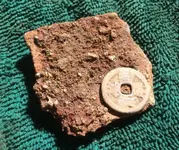I guess I am surprised that none of the American detector companies have tried to imitate the Deus in terms of its light weight, all wireless approach.
But as far as detector technology is concerned, I don't think the American companies are necessarily behind in detector technology from an overall standpoint. I think that other than recovery speed and to a lesser extent the multiple configurations (four operating frequencies and not just frequency offset)/customizations/programmability available, the pure metal detector technology portion of the Deus design is not necessary that much ahead of other American detectors in some respects. Some drawbacks to the Deus design vs. more traditional, yet high technology designs by other manufacturers include:
The Deus design with all the brains contained within the coil assembly does not readily lend itself to the user acquiring affordable specialty or accessory coils (solid coil, sniper coil, large coil, coaxial coil, etc.).
The Deus is highly configurable but not necessarily any more customizable from a programming standpoint as the higher end whites detectors.
There are some advantages (continuous sensitivity adjustments/tonality preferences) to hybrid analog/digital designs or pure analog designs such as some of the Whites, Fisher, and Tesoro machines vs. the pure digital design of the Deus. Similar to the tube vs. transistorized amp argument for audiophiles or the similar LP vs. CD vs. MP3 argument. [The point here is that advanced technology is not necessarily always considered better by the end user]
The Deus does not have simultaneous multifrequency capability like some of the minelab vlf machines (3030/Excal) which enhances salt beach water hunting and more precise Target ID.
The Deus, as a vlf machine, is not necessarily as deep as a minelab or garrett PI machine under highly mineralized soil conditions.
Not as affordable as some of the solid all purpose mid-range first texas machines (Fisher/Teknetics/Bounty Hunter). [not necessarily a technology thing, but there is something to be said about designing an affordable yet capable machine].
So if you look at a bunch of different technologies and approaches to detecting, Deus has America beat on taking full advantage of what wireless tech can do to revolutionize detecting, but lags in other areas of detector technology utilized by American companies.
Are you wrong to make that criticism, not if you are focusing on wireless technology aspect. From a total detector technology aspect, I think the American companies are ahead of XP in some respects.
Thanks for bringing this up, CD. This thread should result in some vibrant discussion.




 buying batteries every other week??
buying batteries every other week?? 


